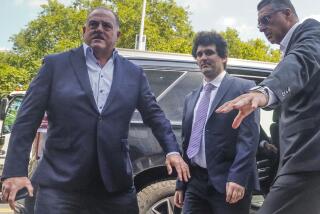Judge Assists Deadlocked Silberman Jury
- Share via
SAN DIEGO — The jury in Richard T. Silberman’s money-laundering trial said Tuesday it is deadlocked and asked for help because it has yet to decide any of the charges against the San Diego financier.
In response, and over defense objections, the federal judge presiding over the case provided further explanation of various legal terms, including the defense of entrapment, which Silberman has asserted. The complex case arose from an undercover FBI sting operation.
Jurors, who resumed deliberations late Tuesday after receiving the new instructions from U.S. District Judge J. Lawrence Irving, gave no indication whether they were close to a verdict on any or all of the charges.
Silberman, 61, who once served as a top aide to former Gov. Edmund G. Brown, is accused of laundering $300,000 that an undercover FBI agent allegedly characterized as the proceeds of Colombian drug dealing.
Though Silberman is standing trial on seven counts, the jury is considering only six. The seventh, which is Judge Irving’s to decide, is a criminal forfeiture charge through which prosecutors are seeking the return of the stocks, bonds and cash involved in the case.
If convicted on all six counts, Silberman could be sentenced to a maximum of 75 years in prison. His trial began May 1.
The case centers on two transactions involving cash supplied by the undercover FBI agent, Peter Ahearn, who was posing as a front man for Colombian drug lords. The first is a November, 1988, swap of $100,000 for stock in a Silberman gold-mining subsidiary. The second is a February, 1989, exchange of $200,000 for U.S. Treasury bonds.
Silberman maintains that the first deal was a legitimate business transaction. He contends that he was coerced into the second by threats aimed at his family by a government informer.
The last time the jury met to discuss the case was Friday. Within an hour of its arrival Tuesday at the downtown San Diego federal courthouse, the panel sent a note to Irving saying it was deadlocked.
Upon hearing that report, Silberman received a kiss from his wife, San Diego County Supervisor Susan Golding.
In a brief hearing that was prompted by the note, jury foreman John T. Uliasz, a Santee nurse, told Irving that the panel had not reached a decision on any of the charges. The panel’s verdict must be unanimous.
However, Uliasz also said that the panel was ready to keep trying. In another note, Uliasz reported that jurors wanted “better definitions” of entrapment, which applies to all six counts, and to the term “structuring,” which is at the center of one of the charges.
In general, entrapment involves a situation where authorities induce an otherwise innocent person to commit a crime. “Structuring” is the term for the process of arranging a transaction to avoid the paper work federal law requires when more than $10,000 in cash changes hands.
Jurors said they wanted to know whether they could find that Silberman had been entrapped into the first transaction but not the second, or vice-versa. In addition, they asked whether they could find him innocent of one count because of entrapment but guilty on other counts.
Irving told the panel that the answers to both questions were yes, since “all, some or none” of what Silberman did could be traced to entrapment. The jury was free to find some entrapment, no entrapment or nothing but entrapment and what result any of those possibilities had on the case, Irving said.
Lead defense lawyer James J. Brosnahan strongly objected to Irving’s answer, saying that, since the judge had already given the jury its instructions when it began its work last week, new material would make it seem that that Irving was pressuring the jury to reach a verdict.
On the same grounds, Brosnahan also objected when the judge announced he would provide additional instruction on structuring.
“We object to everything,” Brosnahan said. “We object to each and every step that’s proposed here.”
The jury had asked Irving to define when “structuring” began. Irving said that it is when a person “knowingly or willfully initiates or participates in initiating” a transaction designed to elude the reporting requirement.
The fourth count in the case against Silberman charges him with directing a scheme to break the $100,000 supplied by FBI agent Ahearn in the first deal into sums under $10,000 for eventual transfer to Switzerland without any records.
More to Read
Sign up for Essential California
The most important California stories and recommendations in your inbox every morning.
You may occasionally receive promotional content from the Los Angeles Times.













